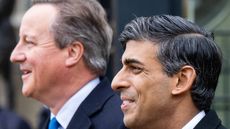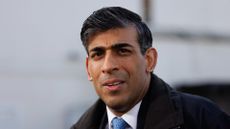Cameron triumphs: but will he come to miss Nick Clegg?
The Tory right has got its wish: the Lib Dems are gone. Which just makes it harder for the PM

As the extent of the shock result began to sink in, David Cameron gave a promise this morning to govern as a One Nation Prime Minister.
But senior Cabinet ministers are already warning that he will have to come to terms with the difficulties of running a government with a wafer-thin majority. And the pressure will come not just from Labour and the SNP, but from the right wing of his own party.
The seismic shift in British politics - the like of which the Mole has never witnessed - was still taking place when Cameron said: “I would want my party to reclaim a mantel we should never have lost - the mantel of a One Nation government.”
Subscribe to The Week
Escape your echo chamber. Get the facts behind the news, plus analysis from multiple perspectives.

Sign up for The Week's Free Newsletters
From our morning news briefing to a weekly Good News Newsletter, get the best of The Week delivered directly to your inbox.
From our morning news briefing to a weekly Good News Newsletter, get the best of The Week delivered directly to your inbox.
Nick Robinson, the BBC’s political editor, asked: “Does he mean it or is it just a slogan? Because that will be the test of how he confronts two of the greatest problems any prime minister can face - saving the United Kingdom, which he wants to do, and renegotiating our relationship with the EU.”
George Osborne, the Chancellor, conceded that Cameron’s biggest test will be the in-out EU referendum he’s promised to hold before the end of 2017.
Cameron is expected to campaign for Britain to remain in the EU. The Tory right is determined we should quit. The split in the party could soon prove a constant headache, just as it was for John Major who in the 1990s ended up calling his eurosceptic Cabinet colleagues “bastards”.
Osborne told Radio 4’s Today programme that Cameron would "not run away" from the problems he faced over the EU plebiscite. And he indicated that with the election victory giving the Tories a clear mandate to govern, Cameron might get an easier ride from fellow Europeans when it comes to renegotiating the terms of Britain’s membership.
That could be wishful thinking. And so too could Cameron’s hopes of bringing together the people of One Nation.
From now on, Cameron knows that every Commons vote will be on a knife-edge. All leave will be cancelled once the Queen’s Speech is delivered on May 27. There will be late nights, the Labour opposition - after its own blood-letting - will try to run the Tories ragged.
And then there’s the SNP Cameron needs to appease with ‘Devo Max’. Alex Salmond has already said that the 'electoral tsunami' which has given the SNP all but three seats north of the border leaves Cameron 'with no legitimacy whatsoever" in Scotland.
The difficulties Cameron will face in holding a government together were spelled out this morning by Lord O’Donnell, the former Cabinet Secretary, who was John Major’s press secretary.
O’Donnell told the Today programme that Cameron may "come to rue” the fact that he is now able to rule without a Liberal Democrat coalition. It means he won’t have Nick Clegg and his colleagues to blame every time he fails to deliver what the right wing of his party want - deeper cuts in welfare and greater cuts in taxes, as well as the tough line on Europe.
The 1922 Committee of backbench Tory MPs, led by Graham Brady, will meet on Monday. Six weeks ago, The Guardian was reporting that this meeting might see the start of an attempt to force Cameron out if he failed to win the most seats. Now it will be an opportunity for desk-banging celebration - but the threat remains that the Tory right will seek to shift Cameron in their direction.
The right wing have never liked Cameron’s claim to be “the heir to Tony Blair” and his modernising agenda, including gay marriage.
Cameron’s surprise triumph will hold off the Brutus tendency for the time being, but they know that after the cheering has died down, Cameron’s days are numbered having announced he will not seek to serve a third term.
Already, as he celebrates his astounding victory, the leadership hopefuls - George Osborne, Theresa May and Boris Johnson - know they have to prepare the long campaign for the leadership challenge that must come before the 2020 election.
Osborne is the front runner, but having won a seat, Johnson cannot be ruled out as the popular choice to replace Cameron. Both men will know they have to convince the right wing of the party if they are to win, and that could stir up more difficulties for Cameron.
Cameron has his great victory, but he knows the next five years could be a lot harder than the last five.
Create an account with the same email registered to your subscription to unlock access.
Sign up for Today's Best Articles in your inbox
A free daily email with the biggest news stories of the day – and the best features from TheWeek.com
-
 'If the election is thrown to the House, 2024 could be a watershed year for American democracy'
'If the election is thrown to the House, 2024 could be a watershed year for American democracy'Instant Opinion Opinion, comment and editorials of the day
By Harold Maass, The Week US Published
-
 How to read polls like a pro
How to read polls like a proIn Depth Sorting through the noise and controversies of modern survey research
By David Faris Published
-
 US overdose deaths fell in 2023, still topped 100k
US overdose deaths fell in 2023, still topped 100kSpeed Read New CDC data shows drug overdose deaths dropped for the first time in five years
By Peter Weber, The Week US Published
-
 Is David Cameron overshadowing Rishi Sunak?
Is David Cameron overshadowing Rishi Sunak?Talking Point Current PM faces 'thorny dilemma' as predecessor enjoys return to world stage
By The Week UK Published
-
 Will Aukus pact survive a second Trump presidency?
Will Aukus pact survive a second Trump presidency?Today's Big Question US, UK and Australia seek to expand 'game-changer' defence partnership ahead of Republican's possible return to White House
By Sorcha Bradley, The Week UK Published
-
 Can Cameron put the Falklands sovereignty dispute to bed?
Can Cameron put the Falklands sovereignty dispute to bed?Today's Big Question Foreign secretary says issue 'not up for discussion' ahead of visit amid renewed push from Argentina
By The Week UK Published
-
 It's the economy, Sunak: has 'Rishession' halted Tory fightback?
It's the economy, Sunak: has 'Rishession' halted Tory fightback?Today's Big Question PM's pledge to deliver economic growth is 'in tatters' as stagnation and falling living standards threaten Tory election wipeout
By Harriet Marsden, The Week UK Published
-
 Will America recognize a Palestinian state?
Will America recognize a Palestinian state?Today's Big Question Israeli leader Benjamin Netanyahu opposes the move. Some see it as the only route to peace.
By Joel Mathis, The Week US Published
-
 Fasting to burger buffets: the weird and wonderful diets of politicians
Fasting to burger buffets: the weird and wonderful diets of politiciansWhy Everyone's Talking About Rishi Sunak reportedly starts his week with a 36-hour fast
By Sorcha Bradley, The Week UK Published
-
 Why your local council may be going bust
Why your local council may be going bustThe Explainer Across England, local councils are suffering from grave financial problems
By The Week UK Published
-
 Rishi Sunak and the right-wing press: heading for divorce?
Rishi Sunak and the right-wing press: heading for divorce?Talking Point The Telegraph launches 'assault' on PM just as many Tory MPs are contemplating losing their seats
By Keumars Afifi-Sabet, The Week UK Published